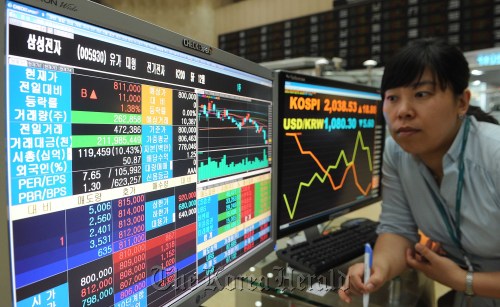Hard-hit Samsung, LG hoping for revival with smart devices
A prolonged underperformance of IT stocks, including Samsung Electronics, seems likely to continue right up until the third quarter.
Experts were upbeat about the long-term resilience of the IT sector, but said the second quarter was not going to hold up as well as previously expected.
“In general, second quarter earnings will show a decline,” said Park Gang-ho, an analyst with Daishin Securities. “There may be some increases quarter-on-quarter, but overall, IT stocks are unlikely to recover until after June.”
A faltering semiconductor industry led the dip in the IT sector, as global demand grew weaker, causing Dynamic Random Access Memory and NAND flash prices to fall since March.
And the decline in such memory prices ― an indicator of weak PC demand ― will continue up until July, industry watchers predicted.
Data collected by DRAMeXchange shows that prices for 2GB and 4GB DDR3 modules in the first half of June slipped almost 3 percent from late May.
A consequent rise in autos and chemicals prices ― which have recently risen by unprecedented levels on the Korean bourse ― has made it less likely for high-tech stocks to experience a rebound soon as the stock market now has fresh bread and butter to turn to in the absence of the IT bellwethers.
 |
A trader in Seoul watches Samsung Electronics share prices on Tuesday. (Lee Sang-sup/The Korea Herald) |
Samsung, LG hit
Reflecting such deepening woes, Samsung Electronics, the world’s largest semiconductor memory chipmaker, on Monday ended at 800,000 won ($735) flat after falling on a third consecutive day of trading.
On Tuesday, the stocks recovered some ground to close at 814,000 won.
The previous 800,000 won had reflected a 21.1 percent decline from the record-high 1.01 million won that the stocks rose early this year.
Merrill Lynch recently downwardly adjusted its price target for Samsung Electronics to 1.2 million won from 1.3 million won citing narrow profit margins for liquid crystal displays and its television business.
Samsung’s LCD business recorded 230 billion won of operating deficit in the first quarter this year.
Nomura Securities took similar action by cutting its target to 1.2 million won from 1.35 million won.
Analysts also were less than upbeat about shares of Hynix Semiconductor, with Korea Investment and Securities lowering its target to 39,000 won from 42,200 won. Hynix shares on Tuesday closed at 25,900 won.
LG Electronics, the nation’s No.2 electronics maker and the world’s third-largest handset maker, were in the same boat as Samsung.
The embattled electronic maker’s stocks ended Tuesday at 82,300 won, up 4.71 percent from the previous day.
But the overall trend has been downward. As of Monday, LG Electronics and LG Display stocks plummetd to the lowest in 52 weeks.
According to FnGuide, LG Display’s second quarter operating profit would fall below 100 billion won on the back of poor TV demand and display price declines.
LG Electronics also was likely to see its net profit narrow on an underperforming mobile communications division, which had registered an operating deficit of 101.1 billion won in the first quarter.
Samsung Electronics was forecast to log a quarterly operating profit of 3.8 trillion won to fall more than 20 percent compared to the previous year, according to FnGuide figures.
The downward forecasts are significant, industry watchers said, as the numbers for the industry heavyweights will most likely affect the rest of the market.
Hopes on smart devices
Hopes are now pinned on smart devices to get the IT sector up and running again.
“The third quarter is a seasonally high time for the IT industry, not to mention that leading IT companies are expected to launch new smartphones and tablet PCs during the second half of the year,” Park said.
Samsung Electronics which in the first quarter of the year was able to log a decent profit thanks to semiconductor performance, will now have to depend on smart devices to give it a leg-up in the coming third quarter.
Galaxy S2, the company’s second-generation smartphone, became a million-seller here within a month of its release, and the company is hoping for global sales to follow suit.
Shin Jong-kyun, Samsung’s head of mobile business, recently said he expects sales of the Galaxy S2 to surpass the 14 million of the previous Galaxy S model.
However, experts predicted that along with semiconductors, the faltering television market will continue to have a toll on Samsung, the world’s top TV-maker.
DisplaySearch, a global market research firm, has lowered its projection for the LCD TVs to 201 million units this year, down almost 3 percent from the 216 million it estimated during the first quarter of this year.
Global economic uncertainties including the crisis in Greece and continued financial concerns from the U.S. and Europe, also are not helping the local IT companies, experts noted.
LG Electronics also has released a number of new smartphones and recently unveiled its 3-D Optimus phones, but it faces stiff competition both at home and abroad with the presence of Apple and Samsung.
By Kim Ji-hyun (
jemmie@heraldcorp.com)





![[Exclusive] Hyundai Mobis eyes closer ties with BYD](http://res.heraldm.com/phpwas/restmb_idxmake.php?idx=644&simg=/content/image/2024/11/25/20241125050044_0.jpg)
![[Herald Review] 'Gangnam B-Side' combines social realism with masterful suspense, performance](http://res.heraldm.com/phpwas/restmb_idxmake.php?idx=644&simg=/content/image/2024/11/25/20241125050072_0.jpg)

